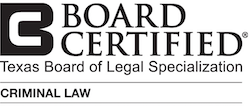DWI v. DUI
In the State of Texas, people often use the terms DWI and DUI interchangeably, thinking they virtually mean the same thing. Nothing could be further from correct in Texas. It is true that other states outside of Texas refer to the operation of a motor vehicle offenses that include the introduction of an intoxicating substance, usually alcohol, or drugs, using nomencaluture that is totally different than Texas. Some states main law against what would we would call DWI, they would refer to as DUI. Some states refer to a similar charge as "OUI" (Operating Under the Influence).
DWI vs. DUI in Texas
In Texas, Driving While Intoxicated refers to what is defined under Chapter 49.04 of the Texas Penal Code, which states, in relevant part, the following:
Texas Penal Code: Section 49.04 - DRIVING WHILE INTOXICATED
(a) A person commits an offense if the person is intoxicated while operating a motor if the person is intoxicated while operating a motor vehicle in a public place.
(b) Except as provided by Subsection (c) and Section 49.09, an offense under this section is a Class B misdemeanor, with a minimum term of confinement of 72 hours.
(c) If it is shown on the trial of an offense under this section that at the time of the offense the person operating the motor vehicle had an open container of alcohol in the person's immediate possession, the offense is a Class B misdemeanor, with a minimum term of confinement of six days.
DUI in Texas
The two terms (DWI and DUI) mean totally different things in the state of Texas. For starters, DWI means "Driving While Intoxicated"; and DUI stands for "Driving Under the Influence." It may sound like the same offense, but according to the Texas Penal Code, they are two different things. If you are an adult and you are pulled over for drinking and driving, you will be charged with DWI (Driving While Intoxicated). If you are under the legal drinking age of 21, the officer that pulled you over while driving will charge you with one of two things. A minor can also be charged with a DWI, or he may be charged with a DUI (Driving Under the Influence). The latter is a Class C misdemeanor.
A DUI is charged under Section 106.041 Texas Alcoholic Beverage Code and is only issued to minors (those under the age of 21). Accordingly, a minor may be charged with a DUI if they are driving with any amount of alcohol in their system, but are still under the legal limit (blood alcohol content of .08). Typical penalties for a DUI include a fine of up to $500, up to 40 hours of community service, mandatory alcohol awareness classes and a license suspension of up to 60 days. Please note, juveniles may still be charged with a DUI. Section 10.041 of the Texas Alcoholic Beverage Code states, in relevant part, the following:
Section 106.041 of the Texas Alcoholic Beverage Code - DRIVING UNDER THE INFLUENCE OF ALCOHOL BY MINOR:
(a) A minor commits an offense if the minor operates a motor vehicle in a public place while having any detectable amount of alcohol in the minor's system.
(b) Except as provided by Subsection (c), an offense under this section is a Class C misdemeanor.
(c) If it is shown at the trial of the defendant that the defendant is a minor who is not a child and who has been previously convicted at least twice of an offense under this section, the offense is punishable by:
(1) a fine of not less than $500 or more than $2,000;
(2) confinement in jail for a term not to exceed 180 days; or
(3) both the fine and confinement.
(d) In addition to any fine and any order issued under Section 106.115, the court shall order a minor convicted of an offense under this section to perform community service for:
(1) not less than 20 or more than 40 hours, if the minor has not been previously convicted of an offense under this section; or
(2) not less than 40 or more than 60 hours, if the minor has been previously convicted of an offense under this section.
(e) Community service ordered under this section must be related to education about or prevention of misuse of alcohol.
(f) A minor who commits an offense under this section and who has been previously convicted twice or more of offenses under this section is not eligible for deferred disposition or deferred adjudication.
(g) An offense under this section is not a lesser included offense under Section 49.04, Penal Code.
(h) For the purpose of determining whether a minor has been previously convicted of an offense under this section:
(1) an adjudication under Title 3, Family Code, that the minor engaged in conduct described by this section is considered a conviction under this section; and
(2) an order of deferred disposition for an offense alleged under this section is considered a conviction of an offense under this section.
(i) A peace officer who is charging a minor with committing an offense under this section is not required to take the minor into custody but may issue a citation to the minor that contains written notice of the time and place the minor must appear before a magistrate, the name and address of the minor charged, and the offense charged.
(j) In this section:
(1) "Child" has the meaning assigned by Section 51.02, Family Code.
(2) "Motor vehicle" has the meaning assigned by Section 32.34(a), Penal Code.
(3) "Public place" has the meaning assigned by Section 1.07, Penal Code.
People who are under the legal drinking limit need to be especially diligent to not drink and drive. Texas considers itself a "zero tolerance" state for anyone who is under 21 years of age and is found drinking and driving. An underage driver is charged with a DUI if they are pulled over and found to have any "detectable amount" of alcohol in his system - and the person would be charged with a Class C misdemeanor. This means an individual may will receive a suspension of his driver's license for 60 days. A fine of up to $500 may also be assessed. This offense could include involvement in community service and an enrollment in an alcohol-awareness program. If the minor's blood alcohol level is over the legal limit of .08 percent, they could also face increased penalties. In this case, he may be charged with the higher DWI charge (see above).
Anyone under 18 years old who is found driving under the influence of alcohol will need to have their parent or guardian to accompany them to all court appearances and alcohol-awareness classes for a DUI charge. The good news is that if the minor individual completes all the requirements imposed on them, depending on the disposition, their record could possibly be expunged when they turn 21 years old.
Contact Us Now
Carl David Ceder has represented many people, including minors, in DWI and DUI charges. He knows the intricacies of the law and how it pertains to your individual case. He has defended many DWI and DUI cases in court and knows the best course of action to take to defend you. You can contact The Law Offices of Carl David Ceder at anytime for assistance at 214.702.CARL(2275) or at 469.2000.DWI(394). You can also e-mail Carl directly, at Carl@CederLaw.com; or to the office for general inquiries at Info@DFWDefenders.com. Phones should be answered 24 hours a day/7 days a week for immediate and personal assistance. E-mail messages will be responded to with 24-48 hours, depending on whether Carl is in trial.




















